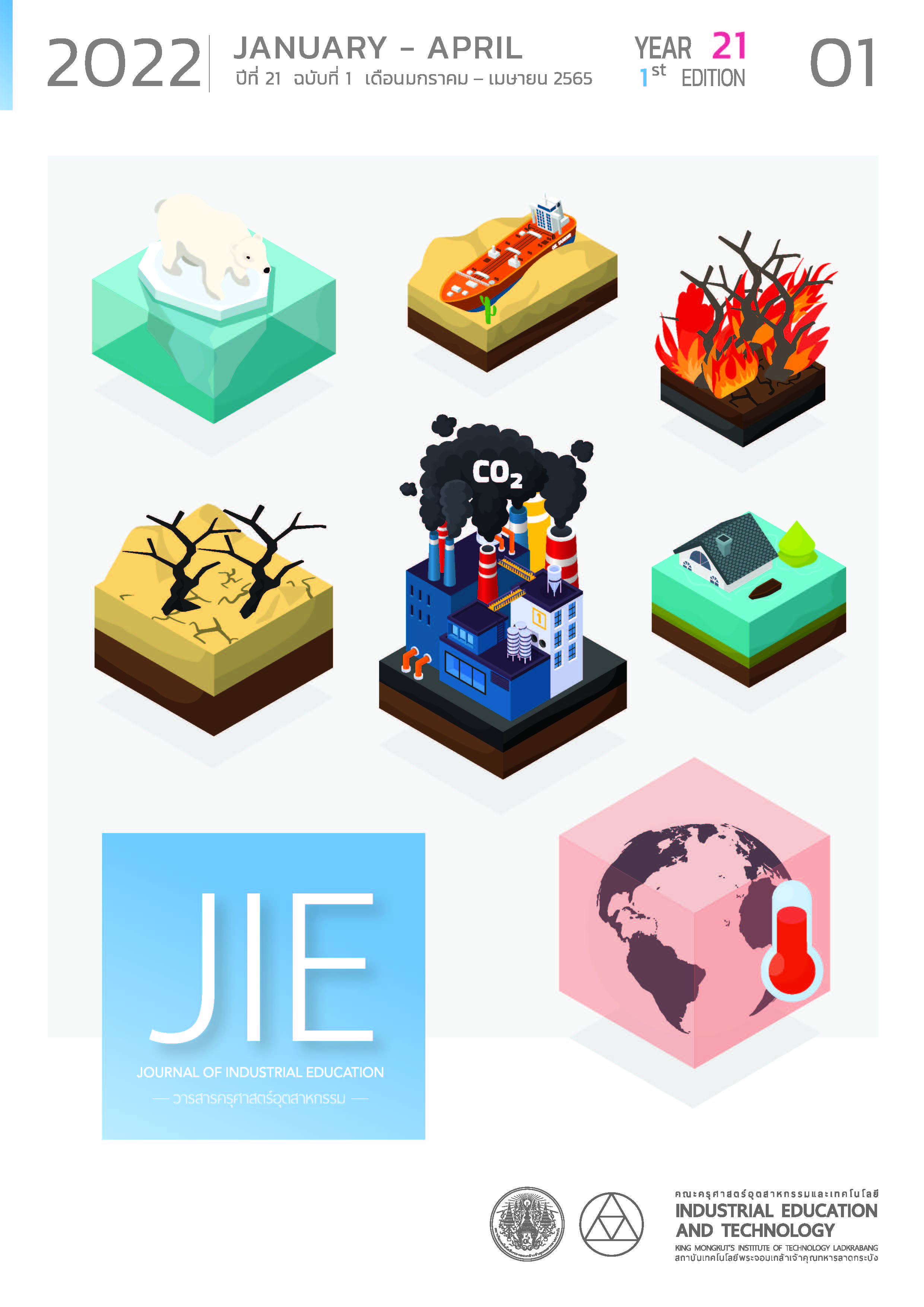AUGMENTED REALITY TECHNOLOGY TO IMPROVE LEARNERS’ SKILLS IN THE NEW NORMAL
Keywords:
Augmented reality technology, AR, Skills development of learners, New normalAbstract
Augmented reality or often called for short that AR is technology that exhibits a virtual image in the real world. Currently, this technology has been widely applied to the education domain and responded to the development of essential skills to survive in the twenty-first century. AR is used to promote self-learning according to the constructivist theory, which believes that learning is a process arising within the learner. Furthermore, the COVID-19 pandemic has conducted to the new way of life, which is called the “new normal”, in which people avoid seeing each other, as well as minimize congestion at all places and contact. For this reason, teaching and learning have been adapted to online learning; the learning is carried out in front of an electronic device’s screen and emphasizes lectures. Consequently, the learner is bored and lacks concentration. Moreover, online learning class has a negative impact on the learner’s understanding, due to some lessons or activities require equipment or a supportive model to promote more substantial understanding. Therefore, AR is an alternative to resolve this problem. The adaptation of AR to active learning would thus create a positive learning environment, as the learner could see the materials as if they were viewing the actual materials and equipment. This article would explain the principle of AR, components of AR, benefits and limitations of AR, the application of AR to the learner’s skills development in terms of language, analytical thinking, visual, and spatial, and the adaptation of AR to the new normal learning.
References
Akkahad, D. (2020). Using of Virtual Technology for Teaching and Learning Management in Thailand 4.0. Era. Journal of Educational Studies. 14(1), 239-252. (in Thai)
Chaijaroen, S. (2014). Instructional design : principles and theories to practices. Khonkaen: Anna Offset Printing Factory Limited Partnership. (in Thai)
Department of Health. (2020). A practical guide for educational institutions to prevent the spread of COVID-19. Q Advertising Company Limited. (in Thai)
Eldokhny, A., & Drwish, A. (2021). Effectiveness of Augmented Reality in Online Distance Learning at the Time of the COVID-19 Pandemic. International Journal of Emerging Technologies in Learning (iJET). 16(9), 199-218.
Fabbri, A., Ramos, C., Haeuney, M. & Zavoleas, Y. (2019). PUTTING THE AR IN (AR)CHITECTURE: Integrating voice recognition and gesture control for Augmented Reality interaction to enhance design practice. Intelligent & Informed, Proceedings of the 24th International Conference of the Association for Computer-Aided Architectural Design Research in Asia (CAADRIA) 2019. (pp.475-484). ResearchGate.
Gaol, F., & Prasolova-Førland, E. (2021). Special section editorial: The frontiers of augmented and mixed reality in all levels of education. Education and Information Technologies (2022). (27), 611-623.
Lertbumroongchai, K. (2013). The construction of Augmented Reality media by Unity + Vuforia.
http://www.oic.go.th/FILEWEB/CABINFOCENTER15/DRAWER051/GENERAL/DATA0000/00000104.PDF (in Thai)
Limpinan, P. (2020). Using Augmented Reality (AR) for Encouraging the Retention of Learning English Vocabulary. Journal of Innovative Technology Management Rajabhat Maha Sarakharm University. 4(2), 7-16. (in Thai)
Meksamoot, A., Boonlue, S., & Tansatien, K. (2020). The Development of the ability in Thai Diphthong Reading by The reading book which using Augmented Reality technology with Gamifications Technique for Grade 3 Students. Veridian E-Journal, Silpakorn University. 10(1), 550-564. (in Thai)
Puangpaka, A., & Wongboonmak, S. (2560). Augmented Reality (AR) in the Library. Phikul Journal. 15(1), 1-13. (in Thai)
Rakkanjanun, C. (2021). Metaverse, the next generation of the Internet closer than we thought. https://www.finnomena.com/mr-messenger/metaverse-next-gen-internet/
Sornjapo, N., Boonyor, S., & Kulsrianantachai, I. (2021). E-Learning of Industrial Machine Foundation Learning using Augmented Reality Technology. In Prakancharoen, S. & Sawatnatee, A. (Ed.), The CRU-National Conference on Science and Technology : NCST 4th 2021, Chandrakasem Rajabhat University. (pp. 204-209). (in Thai)
Suradsrong, K., & Kijkuakul, S. (2021). Model-based Learning Approach Integrated with Augmented Reality for Enhancing grade 10 Students’ Model-Building Skill and Scientific Conceptions in Solution Topic. Journal of Education Naresuan University. 23(4), 46-57. (in Thai)
Svityk, T. (2016). Augmented reality books and their use in real life. https://letzgro.net/augmented-reality-books-use-in-real-life/
Tansiri, P. (2010). Augmented Reality. Executive journal. 30(2), 169-175. (in Thai)
Thongboonma, K. (2021). The Application of Augmented Reality in Experiential Marketing. Siam Communication Review. 20(1), 102-118. (in Thai)
Thornton, T., & Lammi, M. (2021). An Exploration of Augmented Reality in an Introductory Engineering Graphics Course. Journal of Technology Education. 32(2), 38–55.
Tosik, E., & Atasoy, B. (2017). The Effects of Augmented Reality on Elementary School Students’ Spatial Ability and Academic Achievement. Eğitim ve Bilim. 42(191), 31-51.
True. (2020). The genius of the world of fairy tales in the 5G e ….. It's true with True 5G. Download the app Bookful powered by True VBOOK. Open the world of learning English with the most fun through 3D AR virtual reality technology. Simple, uncomplicated, lively, satisfying children 2 year up. https://www.wearecp.com/true-24112020/ (in Thai)
Wa-Japan. (2020). one step further Japanese schools use AR technology to help learn about disasters. https://www.marumura.com/japan-ar-disaster/. (in Thai)
Yoikaew, N., & Rampai, N. (2021). Development of Augmented Reality Application by Using the Questioning Method Based on Constructivism Theory to Enhance Analytical Skills of Second Grade at St. Gabriel's College. Journal of Mass Communication Technology. 6(1), 53-62. (in Thai)
Downloads
Published
How to Cite
Issue
Section
License
Copyright (c) 2022 Journal of Industrial Education

This work is licensed under a Creative Commons Attribution-NonCommercial-NoDerivatives 4.0 International License.
"The opinions and contents including the words in papers are responsibility by the authors."
"ข้อคิดเห็น เนื้อหา รวมทั้งการใช้ภาษาในบทความถือเป็นความรับผิดชอบของผู้เขียน"



